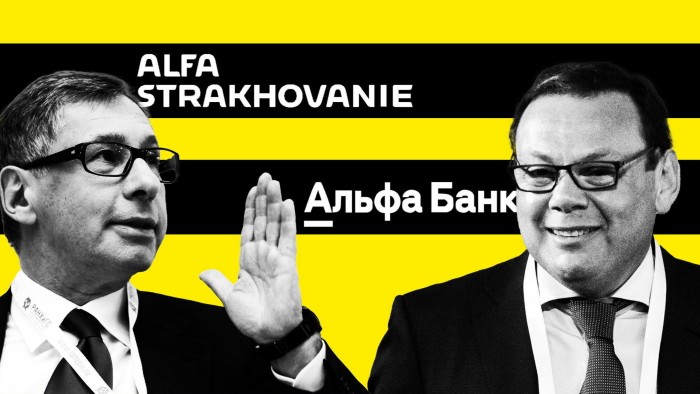Stay informed with free updates
Simply sign up to the Russian business & finance myFT Digest — delivered directly to your inbox.
The sanctioned billionaires Mikhail Fridman and Petr Aven have sold their stakes in Russia’s largest private lender and its insurance arm, as they attempt to overturn EU sanctions against them.
Fridman and Aven offloaded Alfa-Bank and Alfa Strakhovanie to their longtime partner Andrei Kosogov last year, according to documents seen by the Financial Times, completing a deal struck in 2023 that values the two companies at about Rbs240bn ($2.5bn). The oligarchs held a combined 45 per cent stake in the bank and a 42 per cent stake in the insurer.
Kosogov, who is not under sanctions, has emerged from relative obscurity to become the largest shareholder in Alfa-Bank and LetterOne, the Mayfair-based conglomerate, after buying out his sanctioned partners.
The oligarchs hope that selling the bank and insurer — a deal expedited by Russian government intervention on ownership of “economically significant” firms — will aid their challenge to the EU sanctions imposed on them in response to president Vladimir Putin’s full-scale invasion of Ukraine.
Last year, the EU’s General Court partially annulled the basis for the sanctions by ruling the bloc had not presented enough evidence to show Fridman and Aven were involved in efforts to undermine Ukraine.
The oligarchs’ victory was the highest profile blow to the EU sanctions regime against Russia since the invasion.
The EU sanctions remain in place, however, under a separate justification that points to Fridman and Aven’s status as “leading business persons [ . . .] involved in an economic sector providing a substantial source of revenue” to the Kremlin.
Fridman and Aven are separately challenging that justification. If they are successful, EU member states could decide to lift the sanctions, appeal the court decision or reinstate them under another new justification. Latvia has appealed against the first ruling in the oligarchs’ favour.
Anitta Hipper, EU spokesperson for foreign affairs, said the European Commission could not comment on ongoing legal proceedings. “Restrictive measures against Petr Aven and Mikhail Fridman remain in place — these were renewed based on the Council decisions in September 2023 and March 2024,” she said.
Hipper added that the council of EU member states “regularly reviews the listings”.
UK and EU sanctions forced Fridman and Aven, as well as their former partners German Khan and Alexei Kuzmichev, to cede control over investment group LetterOne and resign from its board.
Kosogov, the former head of Alfa’s investment unit, had the smallest share in the oligarchs’ empire until he bought Khan’s and Kuzmichev’s stakes in Alfa-Bank and LetterOne in 2022, making him the largest shareholder in both companies. Khan and Kuzmichev lent Kosogov funds to buy their stakes in LetterOne for a combined $7bn and agreed an option allowing them to buy them back within 10 years, according to a High Court ruling in December.
Kosogov then agreed a deal to buy Fridman and Aven’s stakes in Alfa-Bank via a Cypriot holding company and secured an agreement to finance the purchase with a loan from state-run Gazprombank, according to correspondence seen by the FT.
The regulatory approval in Cyprus required for the sale stalled, however, prompting repeated public complaints by Alfa-Bank’s Luxembourg-based parent company.
In the meantime, Russia passed a law allowing the state to redomicile “economically significant” companies held in western jurisdictions.
The initial list of such firms released by Russia’s government last March only named six — the first three of which were the local holding companies controlling Alfa-Bank, Alfa Strakhovanie, and X5, the supermarket group founded by Fridman.
Two months later, a Russian court annulled the Luxembourg-based company’s rights to Alfa-Bank and Alfa Strakhovanie, transferring Fridman and Aven the rights to hold the shares or offload them to Kosogov.
Kosogov has undertaken to pay for the deal out of his own funds, according to the sale agreements.
Though Cyprus approved the deal in July, the Russian decision had in effect rendered it moot as Fridman and Aven no longer needed to seek EU approval to transfer control of the Russian companies.
The law “gives owners a legal way to wipe their hands, because it’s a court and government decision that they seemingly have nothing to do with, but the companies on the list always had good relations with the Russian government,” said Alexandra Prokopenko, a fellow at the Carnegie Russia Eurasia Center in Berlin.
By allowing Russian companies to pay dividends and protecting them from seizure under the sanctions, the process “ties their owners to the Russian regime even more closely”, she added.
Fridman and Aven declined to comment. Kosogov did not respond to a request for comment.


